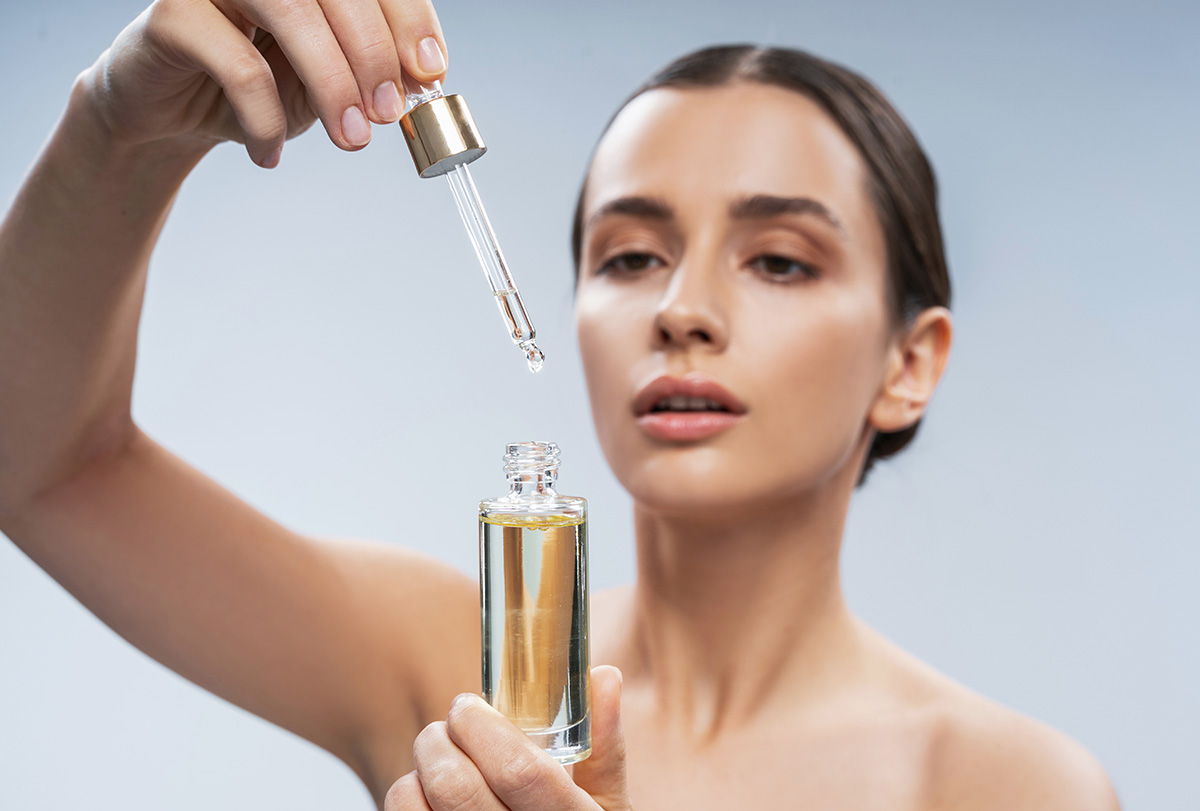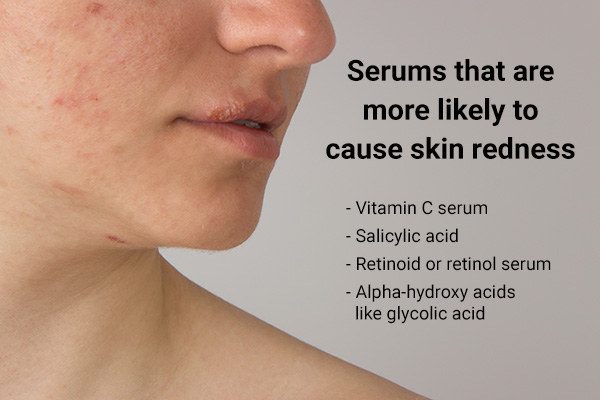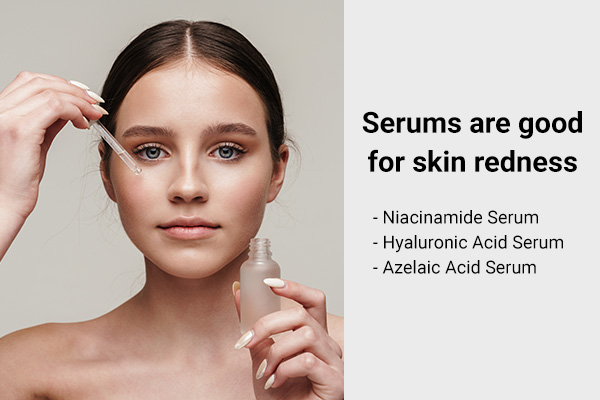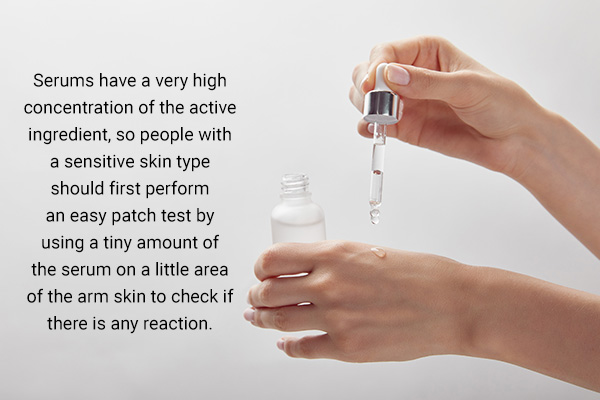In this article:
Recently, the market for skin care products that can provide instant improvement has grown rapidly. This has encouraged the development of products with strong effects that can cause adverse skin reactions over time. One such skin care product is serum.

Serums contain tiny molecules that penetrate easily into the skin.
Although the incorporation of face serums into your everyday skin care regimen can lead to pronounced improvements in skin health within 4 weeks, a serum is a highly concentrated formulation that can cause side effects such as skin irritation and redness. This skin redness can be frustrating, especially when you can’t find a method to eliminate it. (1)
Read below to find out what serums can cause skin redness and which ones can actually fight it. You should also know the right way to use a face serum for its benefits.
Why Do Some Serums Cause Skin Redness?
Serums are designed to be highly concentrated with active ingredients (10x more active ingredients than other skin care products) such as antioxidants, ceramides, and amino acids. These ingredients provide benefits to the skin and can help with a variety of skin concerns.
Because serums are so concentrated, they can be more effective than other skin care products in treating skin issues.
However, the downside of their high concentration is that the powerful ingredients can sometimes cause irritation, especially in those with sensitive skin. This can lead to redness and other related symptoms. (1)(2)
Which Serums Are More Likely to Cause Skin Redness?
The following serums can make you more susceptible to skin redness and discomfort.

1. Vitamin C serum
Experts from Harvard Health say that your skin may get irritated if you use a vitamin C serum, or a retinol serum along with a retinol cream.
Dermatologists share that the form of vitamin C most probable to induce irritation in people with sensitive skin is L-ascorbic acid. This may be because L-ascorbic acid is made stable in water by being formulated at a very low pH.
This incredibly acidic pH delivers ultimate formula stability, but little skin compatibility, leading to the weakening of the skin barrier function. This is why many people with sensitive skin experience skin peeling, skin redness, and other adverse reactions. (3)
2. Salicylic acid serum
Salicylic acid is a type of acne treatment you can buy without a prescription. It works by removing acne blockages such as whiteheads and blackheads from your skin. However, using salicylic acid can cause some side effects such as burning, redness, and skin irritation.
To avoid these side effects, you should only use the treatment a few days a week at first. (4)
3. Retinoid or retinol serum
Adverse skin reactions such as burning, scaling, redness, and dermatitis are linked with retinoid therapy that restricts their use by many people.
This issue is more notable with tretinoin and tazarotene, whereas other retinoids, primarily retinaldehyde and retinol, are extensively less irritating.
In one study, mild-to-moderate irritant reactions were seen in patients treated with isotretinoin, but the signs lessened with decreased frequency of use. (3)
4. Alpha-hydroxy acid serum such as glycolic acid serum
Glycolic acid, which is an alpha-hydroxy acid (AHA) commonly used in skin care products, can sometimes cause redness, swelling, burning, and itching.
The US FDA recommends being careful when using products that contain AHAs such as glycolic acid because they can cause these kinds of reactions. (5)
What Serums Are Good for Skin Redness?
The following serums can come in handy for managing and minimizing skin redness.

1. Niacinamide serum
Niacinamide is a valuable topical agent since it exhibits a stabilizing action on the skin barrier function. It hinders unreasonable water loss from the skin, thereby resulting in an enhancement in the skin’s moisture levels.
It may also be useful in managing skin redness due to acne or rosacea because of its anti-inflammatory activity.
Studies have demonstrated that topical niacinamide is beneficial for aging skin. One of these studies verified that a product containing 5% niacinamide was satisfactorily accepted by the skin and delivered substantial improvements in: (6)
- Fine lines
- Hyperpigmentation spots
- Skin texture
- Red blotches
2. Hyaluronic acid serum
Hyaluronic acid has the capability to enhance the status of skin moisture and has a moisturizing action.
Some hyaluronic acid developments have been confirmed in studies to be useful in defending the skin from UV radiation that may cause skin irritation or redness. Numerous studies have also revealed the usefulness of hyaluronic acid as an anti-inflammatory agent. (7)
3. Azelaic acid serum
Rosacea is a common skin disease that is characterized by erythema, inflammatory lesions, and skin redness. Azelaic acid is a beneficial topical agent that can help fight this ailment because of its antioxidant and anti‐inflammatory actions. (8)
Caution: You may still experience skin irritation, such as itching, burning, or stinging when using this product. If this happens, talk to a dermatologist. (8)
How Are Serums Different From Moisturizers?
Serums are not really like a lotion, cream, or moisturizer, according to the dermatologists from Harvard Health. They are highly concentrated products that are formulated to penetrate the skin rapidly, providing a concentrated dose of components that can deal with common skin issues.
Dermatologists recommended serums for people who are worried about skin aging.
What Else Can Cause Skin Redness?
According to the American Academy of Dermatology Association, many factors may lead to skin redness. These include:
- Sunburn
- Acne
- Dermatitis
- Rosacea
- Allergic reactions
- Skin irritation
How to Use Serums Correctly?
It is absolutely necessary to use serums properly and correctly. This includes remembering the following points:
- Apply serums after cleansing your face with a gentle cleanser.
- Serums should only be used in a reasonable amount, which means a few drops are sufficient for your entire face.
- It is a good technique to use a moisturizer after the serum in order to seal it in.
Who Should Not Use Serums?

Serums have a very high concentration of the active ingredient, so people with sensitive skin should first perform a patch test. Apply a tiny amount of the serum to a small area of your arm skin to check if there is any reaction.
If after the test there is no irritation or a skin reaction, you can employ the serum in your skin care routine. But if you notice redness, inflammation, or other indications of skin irritation, do not use it.
Most-Asked Questions
If I have skin issues, should I use serums?
Serums have high concentrations of the active ingredient. Therefore, if you have sensitive skin or are prone to allergic reactions, it is best that you consult a dermatologist before using any serum.
How should I store my serums?
It is best to store serums in dark cool places unless otherwise specified on the label or the packaging.
Can I use a face serum with a moisturizer?
Yes, it is, in fact, best to follow your serum with the application of a moisturizer to seal the serum in.
Final Word
A lot of factors can cause skin redness such as allergic response, spending time in the sun, skin conditions such as rosacea, and even certain skin care products, which include serum.
Those who have sensitive skin are prone to skin redness as an adverse effect of highly concentrated serums. However, some serums can also help keep skin redness away! You just have to choose and invest in the one that is the best for your skin.
- Was this article helpful?
- YES, THANKS!NOT REALLY


